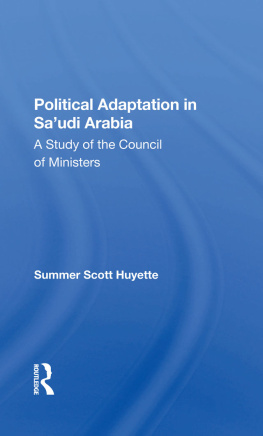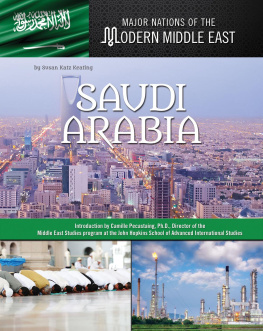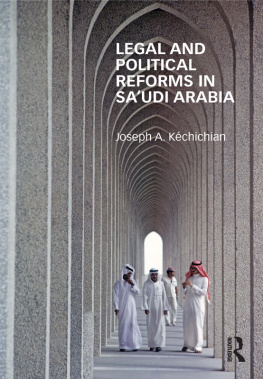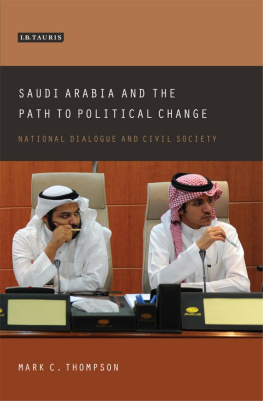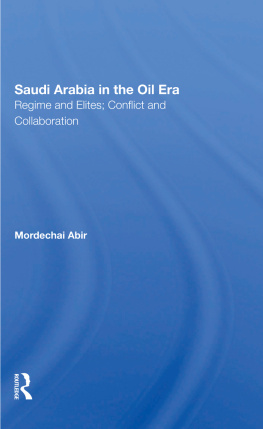Political Adaptation in Sa'udi Arabia
Westview Special Studies
The concept of Westview Special Studies is a response to the continuing crisis in academic and informational publishing. Library budgets for books have been severely curtailed. Ever larger portions of general library budgets are being diverted from the purchase of books and used for data banks, computers, micro-media, and other methods of information retrieval. Interlibrary loan structures further reduce the edition sizes required to satisfy the needs of the scholarly community. Economic pressures on university presses and the few private scholarly publishing companies have greatly limited the capacity of the industry to properly serve the academic and research communities. As a result, many manuscripts dealing with important subjects, often representing the highest level of scholarship, are no longer economically viable publishing projects--or, if accepted for publication, are typically subject to lead times ranging from one to three years.
Westview Special Studies are our practical solution to the problem. As always, the selection criteria include the importance of the subject, the work's contribution to scholarship, and its insight, originality of thought, and excellence of exposition. We accept manuscripts in camera-ready form, typed, set, or word processed according to specifications laid out in our comprehensive manual, which contains straightforward instructions and sample pages. The responsibility for editing and proofreading lies with the author or sponsoring institution, but our editorial staff is always available to answer questions and provide guidance.
The result is a book printed on acid-free paper and bound in sturdy, library-quality soft covers. We manufacture these books ourselves using equipment that does not require a lengthy make-ready process and that allows us to publish first editions of 300 to 1000 copies and to reprint even smaller quantities as needed. Thus, we can produce Special Studies quickly and can keep even very specialized books in print as long as there is a demand for them.
About the Book and Author
Examining the evolution of the Sa'udi government from 1901 to 1983, a period of major social and political transformation, Dr, Huyette looks at the ways in which a traditional elite, the Al Sa'ud, has managed to surmount the formidable obstacles of tribal and regional differences compounded by rapid modernization. The Council of Ministers, formed in 1953, is one method developed by the Sa'udis to cope with these problems and represented the first step toward a national administrative system. Dr. Huyette traces the Council's antecedents as well as the changes in its membership, procedures, and responsibilities and the concomitant changes in the political elite and its style of leadership.
Dr. Summer Scott Huyette received her Ph.D. from Columbia University in 1984. She has lived for the past ten years in Sa'udi Arabia.
Political Adaptation in Sa'udi Arabia
A Study of the Council of Ministers
Summer Scott Huyette
First published 1985 by Westview Press, Inc.
Published 2019 by Routledge
52 Vanderbilt Avenue, New York, NY 10017
2 Park Square, Milton Park, Abingdon, Oxon OX14 4RN
Routledge is an imprint of the Taylor & Francis Group, an informa business
Copyright 1985 Taylor & Francis
All rights reserved. No part of this book may be reprinted or reproduced or utilised in any form or by any electronic, mechanical, or other means, now known or hereafter invented, including photocopying and recording, or in any information storage or retrieval system, without permission in writing from the publishers.
Notice: Product or corporate names may be trademarks or registered trademarks, and are used only for identification and explanation without intent to infringe.
Library of Congress Catalog Card Number: 84-52867
ISBN 13: 978-0-367-28325-4 (hbk)
In November 1974 my husband and I arrived in Riyadh to work for Citibank, just as the 1973 oil price increases were showing their first effects on the Sa'udi economy. My graduate studies had concentrated on Comparative Politics, the Soviet area and the developing nations of the Far East and South Asia but had somehow avoided the Middle East, so Sa'udi Arabia was literally a new and exciting horizon.
As the years rolled by I became proficient enough in the Arabic language to contemplate serious research and in 1981 decided to embark on my long-postponed dissertation for Columbia University. Although I could claim no expertise in the Middle East area I believed my years in the kingdom and access to primary sources of information warranted the effort, and Professor J.C. Hirewitz kindly took me under his wing and guided me through the labyrinth of Middle East studies, directing me to the important literature and the key issues.
In this book I have attempted to gather a wide range of data on the Sa'udi government which should enable Middle East scholars to bring Sa'udi Arabia into the framework of comparative analysis, avoiding in-depth comparisons with other countries in the region. I hope specialists in the area will welcome the study and overlook the lapses arising from my self-acquired knowledge of the Middle East.
Although I have not attempted to adhere to a strict system of transliteration, the translation of Arabic terms and transliteration of names generally follows the Transliteration System for Arabic Geographic Names, published by the United States Department of the Interior's Board on Geographic Names in March, 1957. I have used the apostrophe (') to indicate the letter 'ayn and a raised comma (') to distinguish the hamzah, while omitting other diacritical marks. For the names of public figures or well-known places regularly mentioned in the newspapers I have used the more common renditions. For example, Dr. Solaim, the Minister of Commerce, is referred to as Solaim, not Sawlaym or Sulaym, as this is the way his name appears in the EngUsh press.
Summer Scott Huyette
While the author accepts full responsibility for the content of this book, the successful completion of any major undertaking requires the cooperation and unselfish assistance of people who have expert knowledge of a subject or who control the access to vital information. It also demands the unflinching support and tolerance of one's family. The present author has enjoyed all these in abundance.
My first thanks go to my doctoral advisers: Professor J.C. Hurewitz, who inducted me into Middle East studies, helped to define the objectives and focus on the pertinent issues, and goaded me to refine my writing style and answer the salient questions; and Professor W. Howard Wriggins, who demanded conceptual clarity and a careful analysis of the data. Their expertise and ample experience directed my inquiry and polished its presentation, and without them the study could not have been completed in its present form. Thanks are due also to my Arabic teacher and dear friend, Elias Daher, who enabled me to read and translate documents and conduct discussions in Arabic.
I am deeply grateful to the ministers and senior officials of the Sa'udi government who granted me interviews, giving freely of their time and providing access to important documents. In particular, I would like to thank Dr. Ghazi al-Go saibi, Hisham Nazer and Dr. Soliman Solaim, whose academic backgrounds in political science combined with on-the-job training contributed special insights to the work; Zaki Yamani, who shared his twenty-four years of service on the Council of Ministers; Dr. Motleb al-Nafissah, who helped me to understand the Hanbali school of legal interpretation and the work of the Bureau of Experts; and Turki al-Sudairy and 'Abd al-Rahman al-Sadhan, who explained the development of the civil service and changes in the government's personnel procedures. My heartfelt thanks go to them and to Dr. Muhammad al-Tawail, Director-General of the Institute of Public Administration, who provided me with a desk in the Institute's first-rate library and the kind assistance of the IPA staff. Most helpful were Mustafa al-Sadhan, Director of the IPA Libraries, Fahd al-Askar, Director of the Documentation Center, Sa'ud al-Hozaimy, Director of the Reference Section, and countless others too numerous to mention individually. Their support and enthusiasm for the project were as helpful as the data they shared.

